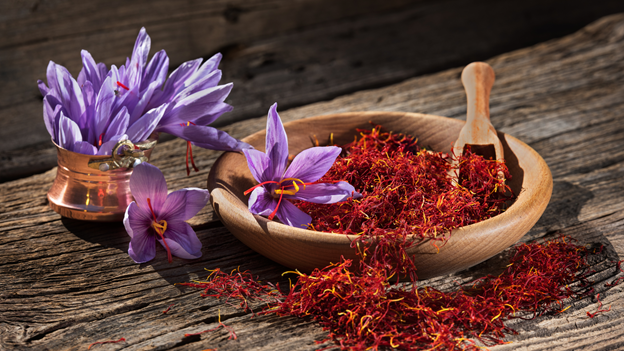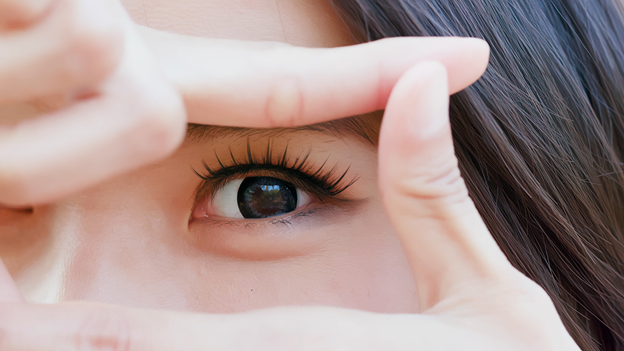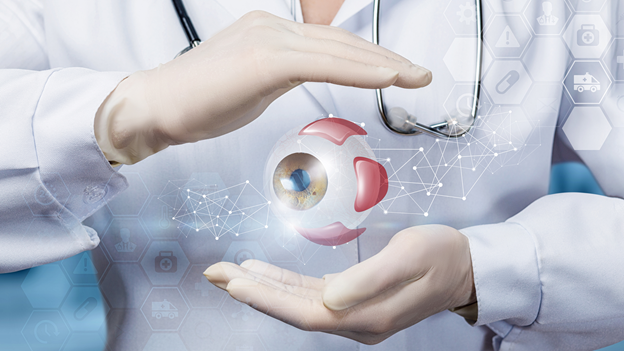Getting to know about the therapeutic benefits of saffron has literally been an “eye-opener” for many. This expensive herb is known for its health benefits but do you know how good is saffron for eyes?

The red thready spice comes from the famous flower saffron crocus. The price tag on the threads of the Crocus sativus flower makes it an item liked by the elite only. The high value of this herb is attributed to the hard work required to harvest it. Despite the high prices, saffron is consumed across the globe just because of the uncanny health advantages.
Health Benefits Of Saffron
Saffron is a part of the exquisite Indian cuisines. It adds a nice and unique flavor to the food while imparting impressive health benefits. The most evident benefits of using saffron are given below:
Saffron Improves Eye Health
Saffron plays an important role in improving eye health. There are multiple ways by which saffron is beneficial for eye health.
1. Protective Effect on Eyes

Eye diseases are common in old age. One of the common eye diseases is glaucoma that usually affects the older generation. It is a neurodegenerative disease that is the result of a loss of retinal ganglion cells (RGCs).
According to a 2019 study, supplementation with saffron protects against neurodegeneration, thus it is neuroprotective in nature. In addition to this, the herb also lends some anti-inflammatory properties. The study concluded that saffron leads to the following changes:
- Reduction in neuroinflammation
- A decrease in the increased intraocular pressure
- Inhibition of retinal ganglion cell death
Another study was carried out on rats suffering from Age-related macular degeneration (AMD). AMD is a neurodegenerative disease of the retina. It was found out that supplementation with saffron improved the retinal flicker sensitivity which was indicative of increased protection of the retina against the light.
If you are frequently exposed to bright lighting conditions and worry that it would be damaging to your eyes, then you ought to have some saffron in the diet. This herb from the Crocus sativus flower is capable of protecting your eyes against strobe lights. It was found in a study that saffron usage significantly counteracts the effects of continuous bright light. The herb does this by protecting your vision cells i.e. photoreceptors.
It offers safety against cataract development. It was found in a study that saffron plays an important role in preventing the formation of selenite-induced cataracts in Wister rats.
2. Acts As Barrier Against Neurodegenerative Diseases Of The Eye
Saffron supplementation will help you stay away from neurodegenerative diseases of the eye. It has been identified that macular degeneration and light-induced retinal damage are caused by increased oxidative stress in the body. A 2019 study claims that saffron, with its antioxidant properties, is potent in providing protection as well as acting as a barrier against the development of neurodegenerative issues.
Neurodegenerative ocular diseases eventually lead to irreversible blindness that can seriously hamper your life. A detailed study identified the following properties of saffron that make it a potent herb for preventing neurodegenerative maladies of the eyes:
- Antioxidant
- Anti-inflammatory
- Anti-apoptotic
Antioxidants such as anthocyanins, carotenoids, and flavonoids, etc are shown to reduce the risk of the development of eye-related diseases. This has been confirmed by a 2019 study. Saffron is a rich source of such antioxidants (carotenoids, etc).
Vitamin A is necessary for the development of normal vision. Beta carotene is a precursor for vitamin A. As saffron is replete with beta carotenes, its positive role on vision is understandable.
Saffron, when given with photobiomodulation (PBM), resulted in greater neuroprotection of the eye against light damage, as proven by a study. This extract of Crocus sativus alters the working of noncoding RNAs and genes to provide neuroprotection.
Safranal in saffron slows down retinal degeneration by preserving the morphology and the number of photoreceptors present in the eye.
3. Recovery And Treatment
According to research, saffron increases the rate of retinal function recovery by significantly increasing the blood flow in the retina and the coronoid.
Stargardt disease is an inherited disease that affects the retina of children. The disease is characterized by loss of vision during early childhood or adolescence. The infirmity causes macular degeneration that eventually leads to cell death. With the saffron supplementation, researchers noted improvements in visual acuity that were attributed to the anti-inflammatory and antioxidant effect of crocin and crocetin found inside saffron.

A decreased/diminished blood flow to the retina and the choroid is considered as a causative agent for eye maladies (ischemic retinopathy, etc.). According to a study, crocin analogs such as those found in the Crocus Sativus efficiently improve the retinal blood flow. The improved oxygen and nutrition supply helps in treating ischemic retinopathy.
The herb is also pretty useful in the treatment of glaucoma. In another study that involved 34 primary open-angle glaucoma (POAG) patients who have received treatment with dorzolamide and timolol eye drops, significant improvements were seen in the group that used saffron extract. A raised intraocular pressure is the most common finding of glaucoma. Oral saffron supplementation imparts a potent hypotensive effect.
Mild to moderate macular degeneration in the eyes can be corrected by the use of carotenoids. Crocins, crocetins, and picrocrocin are the most effective chemicals in saffron. The terpenoids, carotenoids, and phenolics in saffron efficiently cure ocular diseases, a study suggests.
As per a randomized trial, saffron, when given as a dietary supplement (30mg) for 6 months, can provide improvements in retinal function in AMD patients.
4. Improves Vision And Eyesight

Saffron consumption can improve your eyesight too. You may notice a 97% increase in eyesight by taking saffron regularly (20mg of saffron daily). Rapid degeneration of vision is seen in senile members who are entering the later stages of life.
According to a study, carotenoids from saffron have a positive impact on the quality of vision of old adults.
As it slows down the rapid progression of macular degeneration, eyesight loss is delayed. You can use saffron as a weapon against macular degeneration and gain the bounties of your sight. According to a study, saffron helps in the proper development and blood flow of the retina, thus, keeping your eyesight clear and good.
People suffering from diabetes are at a greater risk of eyesight degeneration due to diabetic neuropathy. Such patients should consider adding saffron to their diet because of the anti-diabetic, neuroprotective, anti-inflammatory, and antioxidant properties, a study suggests.
Saffron Tea
Many people consume saffron tea owing to the health benefits it imparts. The positive impacts of saffron on eye health are appreciable even when taken in the form of tea. The herb is considered a super spice for eye health.
Elevates Mood
The herb is frequently known as the sunshine spice.This is because it lets you rise and shine. In ancient times saffron was commonly used as a means of mood elevation. Even in modern times, studies have linked saffron usage to improvements in mood.
This red herb works by ameliorating the symptoms of anxiety and depression that promote wellbeing and positivity. According to a randomized controlled trial saffron supplementation significantly reduces symptoms of depression and other psychiatric disorders.
Crocin found inside the herb is effective for the treatment of major depressive disorders.
As per a meta-analysis of 5 controlled trials, saffron is a key player in alleviating symptoms of depression. Therefore, it can be used as an antidepressant and mood enhancer.
Rich In Antioxidants
Build up of oxidative stress in the body is the cause of plenty of health risks. We are lucky that nature has provided us with many antioxidants in the shape of plants, fruits, and herbs, and shrubs.
One of these antioxidant-rich herbs is saffron. You can find handsome amounts of antioxidants in Crocus Sativus. Following chemicals are the most abundant:
- Crocin
- Crocetin
- Safranal
- Kaempferol
These chemicals have immense benefits on different parts of the body. You can get improved diabetes conditions by consuming saffron. As per a 2020 study published in the International Journal of Preventive Medicine, saffron imparts remarkable antioxidant properties. This feature paired with the lipid-lowering property results in improved insulin resistance in diabetic rats.
According to a 2019 study, saffron extracts have high antioxidant content. The main chemical found is crocin that has strong radical scavenging properties. Detailed research found that the antioxidant effect of saffron played a critical role in inhibiting neurodegenerative diseases.
The red herb contains kaempferol which is a potent antioxidant. Another research found that the herb protected against oxidative stress. This had the additional advantage of improvements in learning abilities, cognition, and memory.
The additional advantage of using saffron is that it lowers cholesterol too. As per a review, saffron reduced cholesterol and can, therefore, be used for improving cardiovascular (heart) health.
Improves Libido
In ancient times, saffron was used for inducing and increasing sexual desires in men (libido). Saffron is linked to boosts in sexual desires in men and women. When given to men and women suffering from sexual dysfunction, it did wonders. According to a 2019 study, saffron supplementation leads to improvements in different dimensions of sexual dysfunction in men and women.
In a study, the effects of Crocus sativus were studies on males with erectile dysfunction. Saffron consumption was associated with increased duration of duration and a significant reduction in dysfunction.
The safranil in saffron imparts an aphrodisiac effect(improves libido). According to another study, the safranal, and crocin in saffron elevate sexual behavior in rats. Therefore, saffron is counted as a potent aphrodisiac food.
The red herb even protects the sperms against DNA damage, a study suggests.
Reduces Risk Or May Even Fight Cancer

It is generally seen that foods that are rich in antioxidants provide anti-cancer properties. According to a study, saffron’s anti-cancer properties are so great that they can be used as an alternate therapy for managing hepatocellular carcinoma. Other studies also reveal the antitumor properties of Crocus sativus.
It was found that crocin is a potent anticancer agent. Therefore, saffron can be used as a chemotherapeutic food. The components of saffron also give off protective properties. According to a study, crocetin prevents the development of malignancies in humans.
Both carotenoids in saffron i.e. crocin and crocetin have shown to have immense positive effects on cancer patients undergoing chemotherapy. The herb retards the growth of cancer cells by inhibiting the nucleic acid synthesis, a study suggests. It has selective toxicity against the leukemic cells.
Aids Weight Loss
Another advantage of taking saffron is in weight loss. A meta-analysis revealed that saffron when given as a therapy alongside fitness training, leads to weight loss after 3-4 weeks. The miraculous herb also suppresses appetite which gives an added benefit while losing weight.
Another meta-analysis showed that saffron efficaciously reduced weight and improved lipid profile. The effect is attributed to the carotenoids and phytosterols present inside the herb. So, if you need to lose weight, you must consider adding saffron to your daily dishes or go for saffron supplements.
Where Can I Find The Best Saffron Supplement?
You can get the best saffron supplement by clicking here. The Golden saffron extract is a completely natural product that aids you burn sugar and lose weight.
The natural extract provided by Behebrbal.com is rich in safranal and unlike other fat-burning supplements, it is free of caffeine. The supplement has the ultimate effect on your eyesight as it improves vision.
Conclusion
Saffron is a red herb that is frequently used in dishes made in Indian households. It is an expensive herb that adds a nice flavor to foods and imparts some impressive therapeutic properties. Saffron was identified as a potent antioxidant and anti-cancer herb. The health benefits of Crocus sativus are seen in the eyes. It works by decreasing macular degeneration, providing neuroprotection, and aiding recovery. It also enhances your vision.
You can also see boosts in sexual performance and libido. Safranal, crocin, and crocetin are the abundant chemicals present that are effective antioxidant and antitumor compounds.





